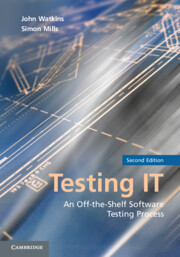Book contents
- Frontmatter
- Contents
- Foreword to the Second Edition by Geoff Thompson
- Foreword to the First Edition by Maurice Rosenburgh
- Acknowledgments
- 1 Introduction
- PART 1 THE TRADITIONAL TESTING PROCESS
- PART 2 THE TESTING PROCESS IN THE REAL WORLD: ILLUSTRATIVE CASE STUDIES
- Case Study 1 The British Library
- Case Study 2 Reuters Product Acceptance Group
- Case Study 3 Crown Quality Assurance Group
- Case Study 4 The Wine Society
- Case Study 5 Automatic Data Processing Limited
- Case Study 6 Confirmit
- PART 3 THE APPENDICES
- References
- Glossary
- Index
Case Study 6 - Confirmit
Published online by Cambridge University Press: 03 May 2011
- Frontmatter
- Contents
- Foreword to the Second Edition by Geoff Thompson
- Foreword to the First Edition by Maurice Rosenburgh
- Acknowledgments
- 1 Introduction
- PART 1 THE TRADITIONAL TESTING PROCESS
- PART 2 THE TESTING PROCESS IN THE REAL WORLD: ILLUSTRATIVE CASE STUDIES
- Case Study 1 The British Library
- Case Study 2 Reuters Product Acceptance Group
- Case Study 3 Crown Quality Assurance Group
- Case Study 4 The Wine Society
- Case Study 5 Automatic Data Processing Limited
- Case Study 6 Confirmit
- PART 3 THE APPENDICES
- References
- Glossary
- Index
Summary
Overview of the Organization
Confirmit supplies software that enables organizations to conduct customer feedback, employee feedback, and market research programs.
The Confirmit customer base is drawn primarily from global 5000 companies and worldwide market research agencies Its customers rely on Confirmit's wide range of products for feedback/data collection, panel management, data processing, analysis, and reporting.
Confirmit takes pride in providing innovative, superior technological solutions that are scalable, secure, and flexible to support its clients' constantly evolving needs. The company is committed to understanding and meeting the needs of its multinational customer base and developing strategic relationships that support this. Confirmit's adoption and use of Tom Gilb's evolutionary project management (67) approach to agile product development and testing is a key factor in achieving these goals.
Confirmit was established in 1996 and rapidly became the leading provider of software-as-a-service (68) feedback and research solutions. In 2007, Confirmit merged with leading market research software provider Pulse Train. Since the merger, Confirmit has evolved its product portfolio to offer a range of best-of-breed solutions based on the combined forty years of software expertise and market knowledge of the two companies. In 2009, this evolution led to the launch of Confirmit Horizons, the world's first fully on-demand, multimode platform for market research, customer feedback, and employee feedback.
Confirmit now employs more than 260 people and has offices in Oslo, Norway (headquarters); Guildford and London in the United Kingdom; New York and San Francisco in the United States; and Moscow and Yaroslavl in Russia.
- Type
- Chapter
- Information
- Testing ITAn Off-the-Shelf Software Testing Process, pp. 187 - 200Publisher: Cambridge University PressPrint publication year: 2010



